|
|
Dreams and Psi Events Before and After Soldiers' Deaths in Turkey ©2007 Ilkin Sungu
It was one of the few wars in history where English, French, Anzacs, Indians and Ottomans suffered dreadful losses and left uncountable şehits. Unbelievable stories accompany realistic ones, persisting as strong beliefs among the people. One of my Grandma’s stories was about how the whole Fourth Norfolk Battalion of Great Britain disappeared in a cloud of fog and was never seen again. But it was still a secondhand story from her colonel uncle who also fell şehit soon after. The undamaged houses at shores and the villages inland were shown as the living evidence of many more cloud stories. I was only seven when my mother, her eyes fixed on the road, tried to stop the horses, yelling to the phaeton driver, “Don’t you see the poor bleeding soldier man? You will crush him!” There was nobody on the road but my mom was screaming, so sure about the bleeding soldier. It was usual to keep the bathrooms clean and leave water for şehits to bathe in, to hear splashes of water or galloping horses at night, or even it rained hard, for the earth to pour out the red color of blood. But this was the first time I witnessed the unusual experience of somebody I could not distrust. Mom was shocked while the old man was trying to soothe her, “Here here, it must be one of them!” Who is a “şehit” and of what importance?
Regardless of their religion or ethnicity all male Turkish citizens have to serve in the military for a certain period. Not only the culture but also the Turkish constitution defines “martyrs” with high regard. According to law a “martyr” is one “who dies under direct fire or is wounded and dies because of these wounds during war. Or the one who is behind the front but dies because of enemy fire, or is wounded and dies during treatment. Who dies immediately or is wounded and dies because of the wound during National Security duty, fighting against terror or anarchy, protecting the borders, etc...”
Traditional Cultural Beliefs about Death and Dreams Turkey’s rich cultural mosaic has interesting traditions and beliefs about death, burial, ceremonies, graves, tomb stones and everything related. An important part of these is the “signs of death,” and dreams are accepted as the most widespread part of such signs. Some events, symbols and objects are closely related with possible deaths. Although the symbols vary somewhat among people, according to some scholars there are five types of possible death dreams. “Dreams related with persons” are the dreams in which the dreamer is called by someone already deceased. In the “dreams related with animals” a horse, wolf, jackal, chicken, crow, or snake may mean death. If the dreamer sees the “belongings” of a dead one, these objects may also mean death. “Dreams related with plants” are the dreams in which we see any plants, fruits or vegetables out of season, or any trees broken. “Dreams with teeth” are of having a tooth pulled out or broken. In these cases, the common tradition is to visit saints’ tombs, pray, and give food and money to charity to try to avoid the possible death. There is not much information about the origin of these “dream-death” beliefs prior to the holy books. Turkish Epics or inscriptions on obelisks don’t mention dreams very much. A few examples in the Oğuz Epics are the dreams of heroes and dreams related with the management of the state. Detailed interpretation of dreams about daily life enters the traditional Turkish belief system after converting to Islam. But still there lies the dilemma of the diversity of symbols implying death while there are not so many motifs in Quran’s Ayets or Hadits. A relationship between some symbols and Turkish Epics can be found. The crow and eagle motifs as death symbols may show similarity with Yakut myths, or the snake with Altay creation myths. We can also try to track down traces of the dozens of civilizations that lived within the Anatolian geography. Or we can say, Turks carried the effects of all cultures they touched, from Chinese to Russian, along their way of migration. These were mixed with their own culture, brought to Anatolia, added to local beliefs in the cradle of civilization and melted in a strange combination. None of this may give a complete explanation, but we have to consider the spread and mixed personal experiences of many beliefs and ethnicities taking their place in the culture over time. Martyrs, their tombs and graves also have an important part in Turkish folkloric beliefs, stories, sayings and legends. It is believed that whenever the nation gets involved in a war martyrs come to help. A light begins to shine over their tombs and turns towards the war area. Examples of some stories are those of Canbolat fighting with his head under his arm in the Canbolat Legend (Cyprus), and of two blonde girls running after the enemy with their heads under their arms in the Blonde Girls Legend (Macedonia). As Quran’s Ayet in Bakara Sureth154 says, “And say not of those who are slain in God's cause, ‘They are dead’: nay, they are alive, but you perceive it not.” Descriptions of the martyrs in religion became an essential belief in the minds of theTurkish people, persisting when the cause is the “motherland” or “state.” There are stories connected with nearly every tomb around Anatolia. Two from Kutahya: At the Şeyhçakar village tomb, whenever there is a war the weapons/arms and the flag in the tomb disappear and reappear in blood after the war. This is claimed to have been seen at the1974 Cyprus Operation. At Hisarcık there are many claims of seeing martyrs leaving their tombs at times of war. Different from other dead, martyrs are believed not to die in terms of the usual understanding of death. In the legend of Seydi Sultan, Seydi Sultan comes to Erzincan with his soldiers and they have a bloody fight with the enemy. Though he wins, his head is cut off from his body. He takes his head from the earth and continues to lead his soldiers. A woman seeing this situation is very surprised, thinking, “My God, what is this?” She feels sorry as soon as she asks one of the soldiers, “Son, what is this? How can he guide the army with his head under his arm?” When she voices these words Seydi Sultan thrusts his sword into the earth and gives his soul. His soldiers turn into seven juniper trees. They die only after the woman sees them. Another interesting phenomenon is that some of their centuries-old bodies are found not decayed when their tombs are opened. In Islam martyrs are buried with their clothes on, without needing to be washed. Some “carbon 24” tests to identify their death dates surprise the researchers.
Turkey has had an undeclared war at our Southeast borders for more than 20 years. Nearly 8,000 soldiers and officials and more than 30,000 civilians and terrorists have died during this disastrous period. The Turkish army doesn’t allow any religious activities or propaganda. On the other side, the terrorist organization PKK is not a “religious” terrorist organization. It was founded as a socialist liberation organization of Turkey’s Kurds but turned into an “ethnic nationalist” terror group. Though the stories, dreams and psi-experiences from past wars and martyrdoms are hard to prove other than a very few, today developments in technology and communication systems help us to be informed of interesting and unbelievable events immediately. These young ones losing their lives leave us not only painful stories but also incredible precognitive dreams about their own deaths or martyrdoms. Some parents foresee their sons’ deaths days before. Some relatives and friends experience extraordinary events. In a land of powerful mysticism, intuitions, beliefs in dreams, and the heart of Sufism, these are not so surprising. Traditionally we use henna in three events: put henna on a lamb meaning to sacrifice to God, put henna on the bride before marriage to bring prosperity and acknowledge the sacrifice of the family, and put henna on the son being sent to the military to represent the sacrifice for the motherland. They are sent to their units with ceremonies, drums and pipes, folk dances and songs, and national marches. In a way, all of these show the inner acceptance of the possibility they may not come back alive.
At military service young soldiers not only part from their own customs and habits but also enter an entirely different world. Even sleeping is hard. The lucky ones sleep with dozens, others on the fields and mountains. It is not a matter of comfort. The southeast has different weather and geography, very hot summers and cold winters, and high mountains with thousands of caves. Young ones (beginning at 18) who never saw guns or death before find themselves in the middle of war and blood after a short training. Here are a few lines from a soldier’s letter: “I have nightmares some nights. Every time I find myself trapped in another corner; sometimes I am in a cave or sometimes between rocks. I hear them, they are coming closer. I feel so afraid, my heart beats so hard. Then I see them, their guns. My hand goes to the trigger but I can’t pull. It doesn’t move. And they aim at me. I give up trying to pull the trigger. I am looking at them and feeling relaxed. I remember I will be a martyr. When they are pulling the triggers I smile. I don’t think these dreams are nightmares. “One wakes up in fear from a nightmare but I feel relaxed when I wake up. And death doesn’t seem so horrible any more… I will post all these to myself. I want to see these words in my postbox when I turn back. Maybe I can understand the value of living without war, without blood better then. Today, all I think here is to protect this station. This station symbolizes my country for me…I am so sleepy; I need to rest for the night patrol.” (December 12th 1993, 10.30 am) “I want to sleep. Even if I know I can’t, I must try to sleep….” (3.45 pm) Most of them report not being able to sleep at the beginning but later get used to falling asleep whenever they find time. There are some reports about nightmares on continuous attacks. But most of the martyr dreams are not about death or attacks directly. Those themes soon become a daily part of their lives. It seems that they can see the difference in their dreams, and make their own interpretations of any dream or intuition to know their future death. What can be the difference they feel when they don’t take a “direct attack dream” as a message about their martyrdom, but “running on green fields” makes them call their relatives to say goodbye? Years later another one tells: “Dreams? They are the last thing I can think of. I find myself asleep as soon as I lie down. Place, crowd, cold, noise, waking up to patrol in the middle of night at below zero, my feet, nothing prevents my sleep any more. Only the nights they wake us for blood, they are the only times I don’t care about sleep. We wait our turn to give blood to the wounded, divided according to blood types. First time I saw and carried the bodies of the dead, the bloody body parts of the wounded, I sat and cried until morning. But now, I get used to that too. This is another world. A dreamless world, in a different kind of dream. What we are living is a dream itself. In this dream world, really in dream or awake your best weapon is your instincts. I am beginning to believe the things I didn’t believe before. My mom tried to train me in all that energy stuff, etc., you know. I laughed at her, wish I could laugh now. There is an area where two fell martyr. Nobody wants to patrol there; some swear they see the martyrs patrolling beside them.” (January 14th 2005) What can be the point which causes an educated young man to change such beliefs? “I still have dreams. If there is not that love for motherland, one can’t do it…” says another. If it is so hard to witness and live, or even remember, how can they “accept” death so easily when a special dream comes? Or, while it is horrible to have a WR (waking reality) experience with a dead one, why is it that these young ones who live experiences with martyrs don’t feel fear?
Some Dreams and Other Experiences Lieutenant Hasan Bulut (02/27/1993) - A villager friend years later (WR): "We were playing football at the prairie near the bridge. I saw a young man walking towards me from the cemetery. It was Hasan walking towards me laughing. I couldn’t believe my eyes. Wasn’t he dead? Was I told wrong? When we were hugging my heart was beating hard. Others who were playing were not seeing us. I asked him where he was for so long, and didn’t he die? ‘Where were you if you didn’t die, while everybody is so sad for you?' He answered, 'No, I didn’t die,' beginning to walk away: 'My place is very good; I am turning back. Nobody should worry for me.' I tried to stop him and call the friends to see, to get happy. He said, 'It would not be proper. They are playing now. Goodbye.'" Commando Soldier Zekeriya Gozyuman (10/26/1995) - Mother telling without tears: “He said, ‘Mom, I will fall martyr. You will not cry.’ I said, ‘Son, if you would be a mother and your son tell this, how you would take it?’ He said, ‘You will feel honor,’ and left. I had a dream at 7th month. An old man with white beard told me, ‘Something terrible will happen but you will not cry.’ He read sacred verses, told me I will be patient. I said, ‘What can happen to me?’ I couldn’t think I will be a martyr’s mom." SAT Commando / helicopter pilot Aykut Tetik (02/15/1996) - Father's dream: "I saw four coffins floating on the sea. Aykut was on one of them, covering it. I told him he may get cold. He told me, 'Dad, give me your blessings. I am going to a duty very far away.’ Next day he died in a helicopter crash.” Soldier Kerim Oruç (04/07/1996) - Told his uncle: "You will see my coffin come covered with the flag." When they wanted to buy new clothes for a wedding he told his father, "Who will wear it? I will turn back as a martyr anyway." Pilot Lieutenant Ayfer Gök (02/10/2001 - First female Pilot Martyr of Turkey) - Crashed with her F-5A jet. She saw the crash in her dream and called her mother and sister. She told them, "I saw my dad in my dream. He called me beside him. I think I will be a martyr." Commander of Turkish Armed Forces, General Hilmi Ozkok (09/05/2004) - Receiving the mothers of şehits, to the ones who were unable to speak: “You don’t need to talk. I can understand you telepathically.” To the one who showed the photo of her son: “Do you see your son in your dreams?” “Yes.” “Then tell him my greetings. Say, ‘Your commander salutes in front of you!’” Gendarme Soldier Doğan Kef (07/31/2005) - Father, Mehmet Kef: “I saw him in my dream a week before. He said, ‘I will not come back home.’“
Commando Soldier Melih Tuncer (same day) - Before moving to his duty at Tunceli he told his mother, "Mom, I sense it inside. I will be a martyr. Give me your blessings." Air Force Soldier Uğur Özdemir (07/28/2006) - Mother: “He called a day before, said ‘Mom, I am seeing children’s graves in my dreams,’ and asked for my mother blessing.” Soldier Mükremin Er (04/02/2007) - He came to visit his family three months before his death. Visited his grand father's grave and bought the place beside it for himself. Told his father he will fall martyr, and to dig his grave and make ready. Lieutenant Halil Demirors (05/17/2007) - Grandfather’s dream a night before: "I put a loaf of bread on the stove. When one side burned and became black, the other side was left white. Two sides of this event: black, burning, about his death; and white about the holiness of his martyrdom." Lieutenant Mesut Uzun (06/01/2007) - A ten-year old girl from his village: "I saw brother Mesut with Prophet Mohammed in my dream. They came near me, entering from a door. Brother Mesut told me 'I am in paradise now. Don’t worry for me. Help my brother who is in the first grade.' Then our Prophet said, 'He is very comfortable and at the paradise now.' And they left from the same door." Soldier Ilhan Saglam (06/06/2007) - Mother's dream a night before: "Wolves were attacking the lambs. I threw rocks to save the lambs but they attacked more. I couldn’t save the lambs." Soldier Muhterem Yağbasan (04/10/2007) - Mother: "I knew he would be a martyr. A night before his birth I had a dream. In my dream somebody told me, 'You will have a son, name him Muhterem. He will join the army; he will be a great soldier in war.'" Commando Corporal İkram Cirit (06/10/2007) - Two days before he called not only his parents but all his relatives to say farewell. He said, "I saw in my dream. I will be a martyr." Lieutenant Colonel Alim Yılmaz (same day) - Died in a landmine explosion. Mother: “I had a horrible dream towards the morning. There had been an explosion. I heard my son's voice calling 'Mom.' His face was burned to his neck. I tried to hug him, saying 'Don’t be afraid, son, I am beside you,' but he suddenly disappeared beginning from his face. I was searching for him shouting, 'Alim, my son.' I woke up with fear. The news of his death came that afternoon." Soldier Ramazan Cuma (06/17/2007) - Brother, Erol Cuma: "I was seeing my deceased father in my dream for the last week. He was telling me that there will be many martyrs and we should make preparations. We were sensing he would be the one for the last week." Soldier Ali Balıkçı (06/20/2007) - Father (WR): "I couldn’t sleep that night. I woke up at 1:30 am in distress. I walked to the fields. I saw a group of soldiers walking towards me and remembered my wife’s dream of the previous day. She told me she saw him in her dream saying, 'I am very comfortable here,' and I replied 'Dreams come true in reverse.' At that minute the soldiers disappeared and I realized he’d fallen martyr. We received the news that afternoon." Gendarme Sergeant Fatih Çarman (08/01/2007) - Rukiye Çarman: “He phoned and said, ‘Mom, I am having strange dreams. I deal with colors of green and flags in my dream. I may fall martyr. I love you, Mom.’ And we blessed each other.” Soldier Ayhan Güngör (08/04/2007) - Mother: “Ayhan said he would not come back; he knew he would fall martyr.” Twin brother Beyhan: "He called at our birthday. He asked the date of my wedding. When I said we are waiting his return, he told me, ‘Don’t wait for me, have your wedding; I will be a martyr’. He put all his photos over the cupboard before he left and told mom, ‘Don’t forget me, and remember me looking at these. I will be a martyr,’ as he knew.” Lieutenant Çağlar Canbaz (08/07/2007) - Father: “I had a dream the night he was born. He was wrapped in a green cloth and slowly going away. Yesterday was his 27th birthday. We were waiting for night to call him. He fell martyr on his birthday.” References Akinan, Serdar 2007 Kan Uykusu 1-2 / Blood Sleep 1-2 – Istanbul, Karakutu Yayınları Aydın, Erdoğan 2007 Nasıl Müslüman Olduk / How We Became Muslim – Istanbul, Cumhriyet Kitapları Evrensel, Hakan 2004 Güneydoğu’dan Öyküler / Stories From Southeast – Istanbul, Alfa Yayınları Eyüboğlu, İsmet Zeki 1998 Anadolu İnançları / Anatolian Beliefs – İstanbul, Toplumsal Dönüşüm Yayınları Onder, Ali Tayyar 2007 Türkiye’nin Etnik Yapısı / Turkey’s Ethnic Construction – Istanbul, Fark Yayınları Turkkan, Reha Oğuz Türkkan 2007 Biz Kimiz? / Who Are We? – Istanbul, Pozitif Yayıncılık Hurriyet, Milliyet, Sabah Newspapers Görk, Reyhan Varlı - Death and Funerals In Sunni Communities of Turkey- http://www.inter-disciplinary.net/mso/dd/dd4/gork%20paper.pdf Başgöz, İlhan (Indiana University) - Dream Motif in Turkish Folk Stories and Shamanistic Initiation - http://www.nanzan-u.ac.jp/SHUBUNKEN/publications/afs/pdf/a181.pdf Kalafat, Yaşar – Culture Levels in Turkish People Beliefs / Turk Halk Inanclarinda Kultur Kadları - http://us.share.geocities.com/yasarkalafat/turk_halk_inanclari.doc Rights Entitled to Heirs of Martyrs - http://www.tsk.mil.tr/eng/genel_konular/sehithaklari.htm http://turkoloji.cu.edu.tr/ESKI%20TURK%20%20EDEBIYATI/yeniterzi_07.pdf http://turkoloji.cu.edu.tr/ESKI%20TURK%20DILI/4.php http://turkoloji.cu.edu.tr/HALKBILIM/41.php
Close window to return to the bulletin board
|
| IASD Home Page | PsiberDreaming Home |

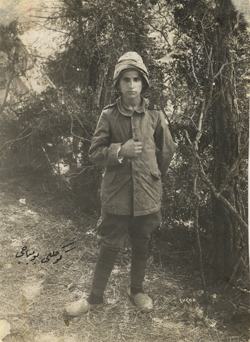 Stories about şehits (martyrs) entered my life in early childhood from the firsthand experiences of my grandmom who lived the Çanakkale Wars (Dardanelles) of 1915 as a child and National Independence War as a teen. She used to tell us how rivers flowed red with blood, how they put her and her best friend in the two pockets of a saddlebag and sent them to inner villages while her mother and older sister stayed back to help the soldiers. We used to find bone pieces, uniform buttons, purses, tobacco boxes and other remaining traces of war when we'd dig the earth a little.
Stories about şehits (martyrs) entered my life in early childhood from the firsthand experiences of my grandmom who lived the Çanakkale Wars (Dardanelles) of 1915 as a child and National Independence War as a teen. She used to tell us how rivers flowed red with blood, how they put her and her best friend in the two pockets of a saddlebag and sent them to inner villages while her mother and older sister stayed back to help the soldiers. We used to find bone pieces, uniform buttons, purses, tobacco boxes and other remaining traces of war when we'd dig the earth a little. 
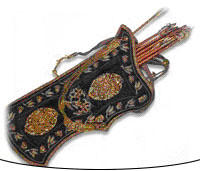
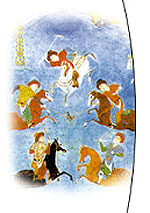
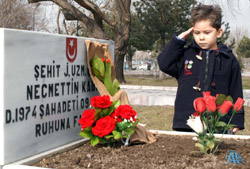
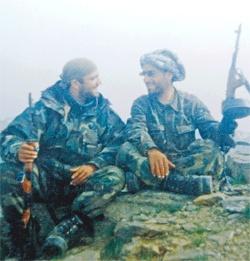 Though in time we become used to precognitive dreams, they generally disturb most people even if they are not about their own or anyone else’s possible death. It is amazing how these dreams and other events are easily accepted and received with calmness by these young men and relatives.
Though in time we become used to precognitive dreams, they generally disturb most people even if they are not about their own or anyone else’s possible death. It is amazing how these dreams and other events are easily accepted and received with calmness by these young men and relatives. 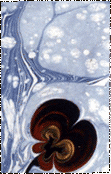 I am not sure if these dreams of martyrs prior to their deaths ever get much attention. Still all we know is whatever we hear or read in the news. Eighty-nine soldiers have fallen martyr in 2007 before the end of August. More than one-third of these deaths were reported in the media along with families’ reports of dreams. I don’t see any conscious attention to these dreams. Dreams are seen as “normal,” their sense seen as “God’s work.” But although their deaths as martyrs give honor and consolation, they are not accepted as “normal” or “God’s wish” but raise fury, fueling terror and world politics. Legends of yesterday’s martyrs are everywhere, but dreams of today’s martyrs are unknown to us.
I am not sure if these dreams of martyrs prior to their deaths ever get much attention. Still all we know is whatever we hear or read in the news. Eighty-nine soldiers have fallen martyr in 2007 before the end of August. More than one-third of these deaths were reported in the media along with families’ reports of dreams. I don’t see any conscious attention to these dreams. Dreams are seen as “normal,” their sense seen as “God’s work.” But although their deaths as martyrs give honor and consolation, they are not accepted as “normal” or “God’s wish” but raise fury, fueling terror and world politics. Legends of yesterday’s martyrs are everywhere, but dreams of today’s martyrs are unknown to us.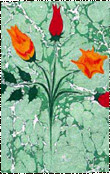 Gendarme Soldier Şener Karadede
Gendarme Soldier Şener Karadede